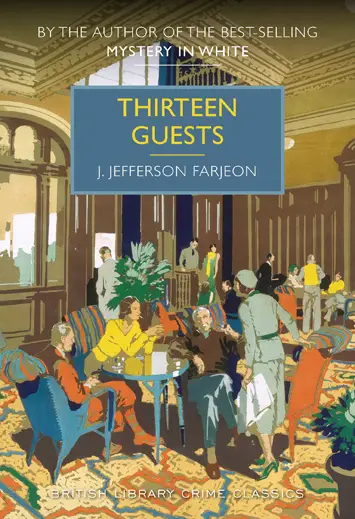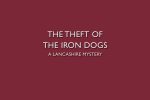Thirteen Guests by J. Jefferson Farjeon – Review

By Sandra Callard
The British Library holds a vast collection of murder mystery novels written during the Golden Age of Crime Fiction of the nineteen twenties and thirties, and this book, Thirteen Guests by J. Jefferson Farjeon, is typical of the genre. Written in 1936 it is set in a large country house in the south of England, where the Lord and Lady of the manor are hosting one of the functions now looked back on with distaste, the brutal and sad stag hunt. In the era, this “pastime” was readily accepted, so the book must be viewed with this in mind.
The guests are a diverse collection which includes friends from the aristocracy, an actress hoping for help to finance a new stage play, a crime writer who has no other conversation but her books, and a varied selection of friends and unknown friends of guests, including a famous journalist, Lionel Bultin, who has a sharp tongue reminiscent of Oscar Wilde. The odd one out of this collection is a young man, John Foss, who has had an accident on emerging from the same train as did the guests, and was, rather strangely, taken along with them to recuperate.
 This sets the scene for an absolutely classic whodunnit which is heightened by the superb writing of the author. His flawless grammar is gloriously reminiscent of an era and a society where every word seemed to be chosen with great care to elicit the proposed effect. Startlingly, after the better part of a century, those same words still have the power to impress, as do Farjeon’s characterisations. These are executed with an exceptional skill and there is no difficulty in seeing each one as they appear.
This sets the scene for an absolutely classic whodunnit which is heightened by the superb writing of the author. His flawless grammar is gloriously reminiscent of an era and a society where every word seemed to be chosen with great care to elicit the proposed effect. Startlingly, after the better part of a century, those same words still have the power to impress, as do Farjeon’s characterisations. These are executed with an exceptional skill and there is no difficulty in seeing each one as they appear.
“Extremely entertaining”
Slightly on the down side of this is the incredibly tortuous twists and turns of the plot. It requires some turning back of the pages to reread as you come across something you don’t understand, usually where there are reams of conversation between two people, sometimes over multiple pages, where the track can be lost as to which character is speaking. However, there is a very appealing character in Detective Inspector Kendall, although his massive summing up of the case towards the end of the book is astoundingly unbelievable, as he seems to have found out every single move of every single suspect over two days. The more you read the more astounding it becomes that anyone, even a policeman, could have such resources of recall. Amazing, but somehow fitting and extremely entertaining.
As the years have passed, the work of this author, J. Jefferson Farjeon, seems to have fallen below, not just of the the might of Agatha Christie or Dorothy L Sayers, but also of other brilliant Golden Age writers such as Anthony Berkeley and E C Bentley. However, Farjeon’s work was read and admired admired by many at the time. His novel No 17 was made into a film by Alfred Hitchcock and his Murder Over Draughts was adapted for both radio and television.
Thirteen Guests is so typical of Farjeon’s work that this book and his other dozens of publications certainly merit re-reading and I am pleased that he has attained a well deserved place in the British Library’s Crime Classics.
‘Thirteen Guests’ by J. Jefferson Farjeon is published by the British Library, £8.99 paperback









